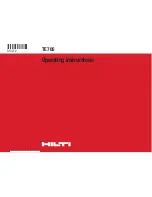
METRO POWERPOD™ SYSTEM —
INSTRUCTIONS FOR USE
5
www.metro.com
L01-622
REV 06/19
battery must be tightly secured to the battery terminals.
3. Caution:
To prevent possible damage to the power module when using a Li-Ion battery, make the battery DC power
connections before making the battery communication connections (and reverse the procedure when disconnecting the
battery).
4. Caution:
Do not drill into or attempt to open any part of the power module housing, there are no user-serviceable parts
inside. Do not attempt to use the power module if any part of it becomes damaged.
5. Caution:
To avoid the risk of electrical shock, only connect this equipment to a supply mains that provides a protective
earth connection.
6. Caution:
The EMISSIONS characteristics of this equipment make it suitable for use in industrial areas and hospitals
(CISPR 11 class A). If it is used in a residential environment (for which CISPR 11 class B is normally required) this
equipment might not offer adequate protection to radio-frequency communication services. The user might need to take
mitigation measures, such as relocating or re-orienting the equipment.
7. Caution:
Output voltage is only supported for a limited time, depending on battery size and load. Suitability of runtime
on battery needs to be evaluated in the end use application.
8. Caution:
All SIP/SOP (SIGNAL INPUT/OUTPUT PART) Connections are for SELV (Safety Extra-Low Voltage) Only.
Statement of Intended Use:
Caution: Not intended to power life support equipment.
Caution:
Do not use this equipment within oxygen enriched atmospheres, or within 0.3 meters of a point at which oxygen
enriched atmosphere is intentionally vented.
Environmental conditions:
Storage temperature: -15 to 50 Degrees C. (5 to 122 Degrees F.)
Operating temperature: 0 to 40 Degrees C. (32 TO 104 Degrees F.)
Humidity: 5% to 95% RH (non-condensing)
Symbols and Markings:
Class I = Protective Earth required.
= Refer to Instruction (Application Guide)
= Alternating Current.
IPXO = No Ingress Protection.
For batteries recycling/disposal in the United States and Canada, call2Recycle.
For other countires, batteries must be recycled / disposed of in compliance with local regulations.
Contact InterMetro service for
product repair or battery
replacement. Use of unauthorized
service or batteries will void
warranty, damage equipment,
and / or affect performance.
NOTICE
C05-1100






































